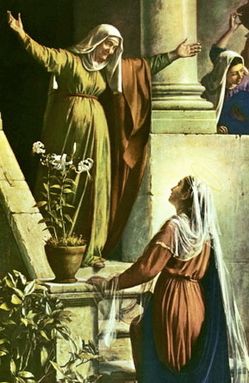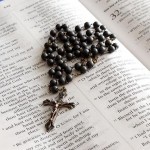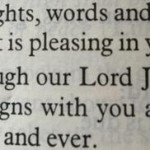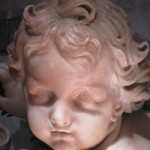
If you are snowed in, you have time to indulge me, but even if you are scurrying around, I urge to take a few minutes to read Deacon Greg’s meaty homily on what we Catholics call “The Visitation,” – the moment in the Gospel where Mary, confronted by Gabriel and overshadowed by the Holy Spirit, has gone to visit her elder kinswoman, Elizabeth, who was also with child. Writes Greg:
[Elizabeth] knew that she was greeting her Messiah.
Pope Benedict has written that the Visitation is more than just a trip into the country for a young girl from Nazareth.
As he explains, when Mary “set out in haste” to visit her cousin Elizabeth, she embarked on the world’s first Eucharistic procession. She carried Christ into the world. She was a living tabernacle. And so it is that her cousin became the first to experience Eucharistic adoration, and to share in the first Benediction. “Blessed are you,” she says to Mary. “Blessed is the fruit of your womb. Blessed are you who believed.” Three times, she speaks the word “Blessed.” I can’t help but be reminded of our own Benediction, when the bells ring three times, and then we chant the divine praises: “Blessed be God…”
Just as Elizabeth would be the mother of the voice crying in the wilderness – the voice preparing us for the Word – so here, she also gives voice to our own feelings of anticipation, and wonder, and hope.
“How does this happen to me?,” she asks. Any of us could ask the same question, as we kneel before the Eucharist — as we will in just a few moments — and behold, as Elizabeth did, our savior in our midst.
“How does this happen to me? Lord, I am not worthy…”
In Rumer Godden’s exquisite novel
In This House of Brede, there is a moment when Abbess Catherine, who has been elevated to that office in a time of unusual stress for the Brede Abbey, also contemplates this moment in the Gospel:
Every evening at Vespers in these days Abbess Catherine, as if echoing the Abbot’s words, thought, as the antiphon to the Magnificat was sung, of the Visitation, when the Virgin Mary, with the angel’s announcement beating in her heart, had gone “in hast,” as Saint Luke says, to visit her far older cousin. Why, wondered Abbess Catherine, did the theologians always teach -and we take it for granted – that Mary went simply to succour Elizabeth? Probably she did do that, but could it not also have been that she needed the wisdom and strength of an older woman? How wonderfully reassuring Elizabeth’s salutation must have been : “Whence is this that the mother of my Lord should come to me?” A recognition without be told, and Mary, as if heartened, touched into bloom by the warmth and honor of that recognition, had flowered into the Magnificat.
I love the juxtaposition of these two ideas, that Mary was “the first Eucharistic procession, carrying Christ to the world,” and that she is (within the context of that great and supernatural privilege) nevertheless seeking out a bit of human consolation and support.
Considered in this way, Mary is a prophecy of the Bride, the Church – containing the Body of Christ – but sustained and heartened by fellowship and outreach. Encountering and receiving Christ into one’s heart, soul and mind is at once a release and a charge -a saving and a responsibility; it is a moment when “everything is different” and yet we are still our faulty selves. Realizing this makes us both hopeful and a little unsettled, and so we seek out what is both familiar and good.
As with everything in scripture, Mary’s visit to Elizabeth is packed with meaning and instruction. How good that in Advent we take the time to consider these “smaller” moments of scripture.
We Catholics must seem “Incarnation-fixated” to non-Catholics. In the Liturgy of the Hours, our Morning Prayer includes the Gospel Canticle of Zechariah (“Blessed be the Lord, the God of Israel; he has come to his people and set them free”) and Vespers brings us the Magnificat. We begin and end the day recalling the very first moments of the New Testament.
In praying the Joyful Mysteries of the Rosary, we are rooted solidly in the beginning of the Gospels.
When we pray the Angelus, several times a day, we bring into sharp focus those incredible moments shared by Mary and Gabriel, when it is revealed that the God of Jacob is doing the unthinkable, and Incarnating – taking on the flesh and blood mortality of his own Creation. It is a prayer of profound wonder and gratitude, and it is fundamental to the rest of it, because it breaks the whole pageant of Salvation down to this unparalleled truth: We are so boundlessly beloved by the Creator, that he would surrender to us, in order to raise us to him. It is the mystery that any lover instinctively knows – that love, first and foremost, serves.
The Incarnation, the mystical wedding of heaven to earth, is a mystery one can stand at in awestruck wonder for all the days of one’s life, with comprehension only beginning.
It is getting late; Christmas is nearing. Deacon Greg says, of this wonderful season of preparing, which is Advent:
We still have a few days left to prepare for Christmas – and for Christ. We can never be worthy of him. But we can be ready.











